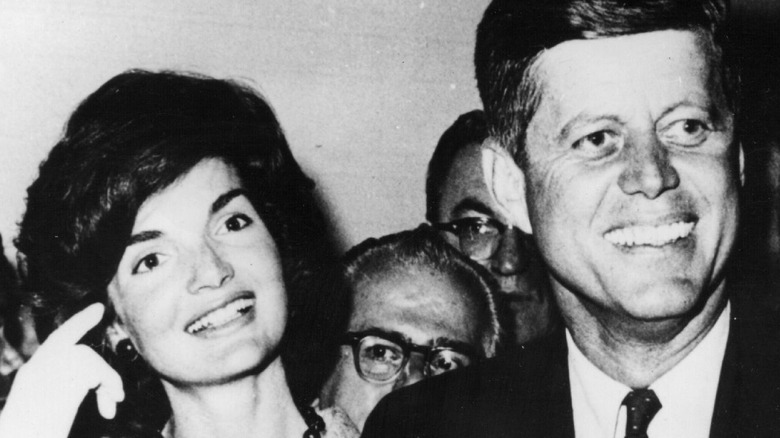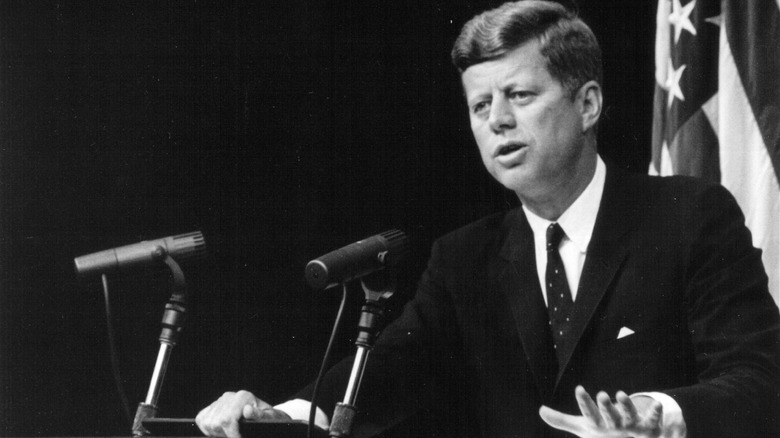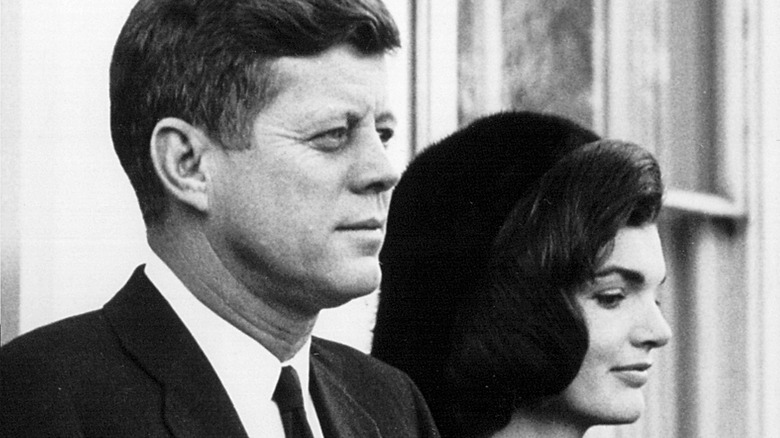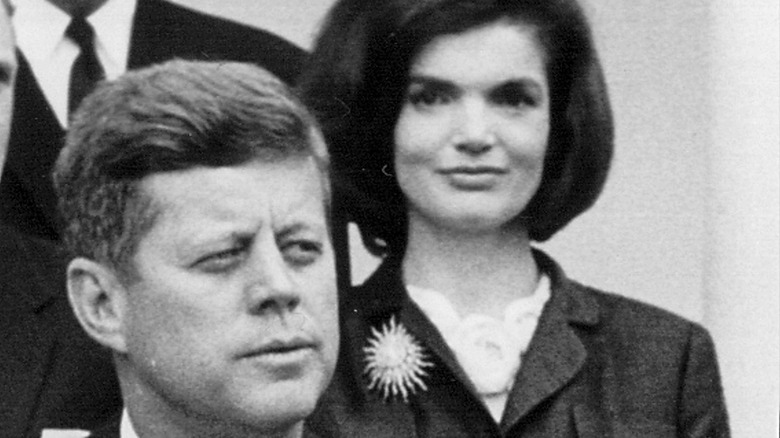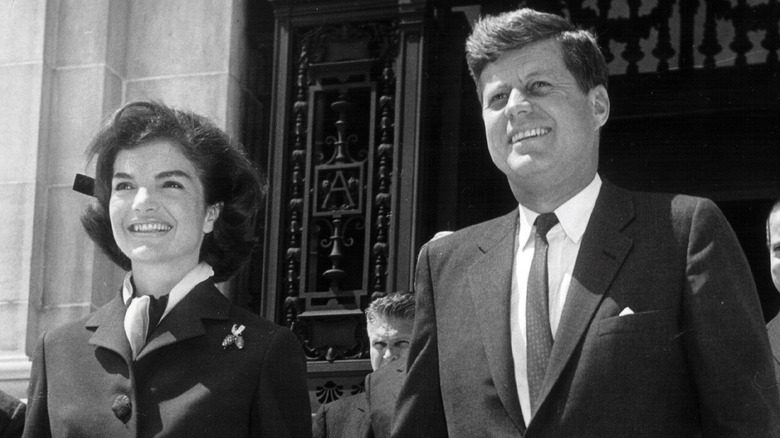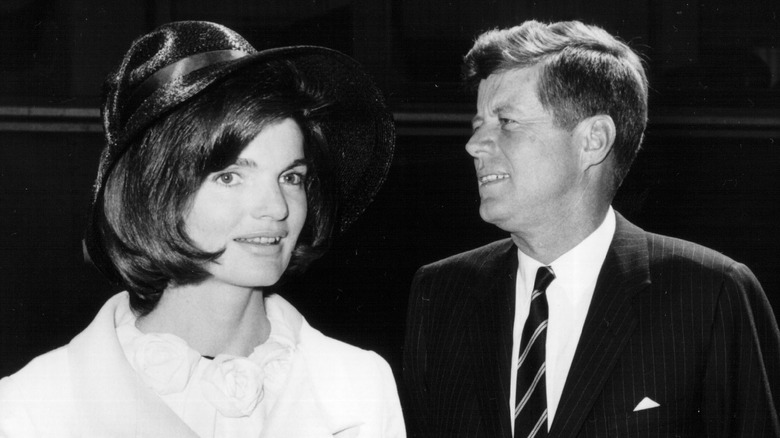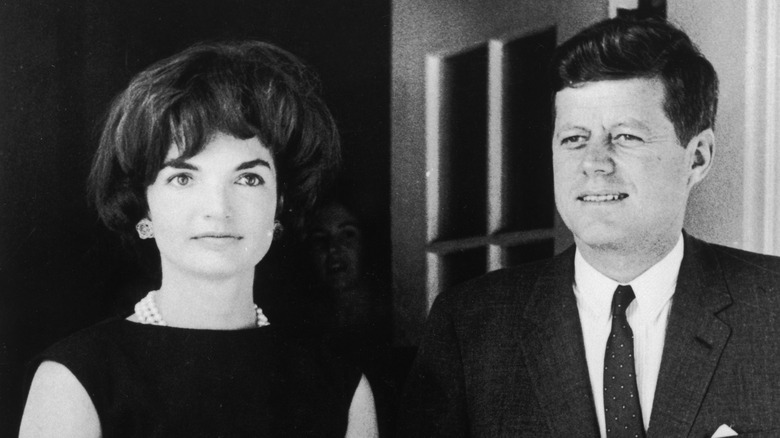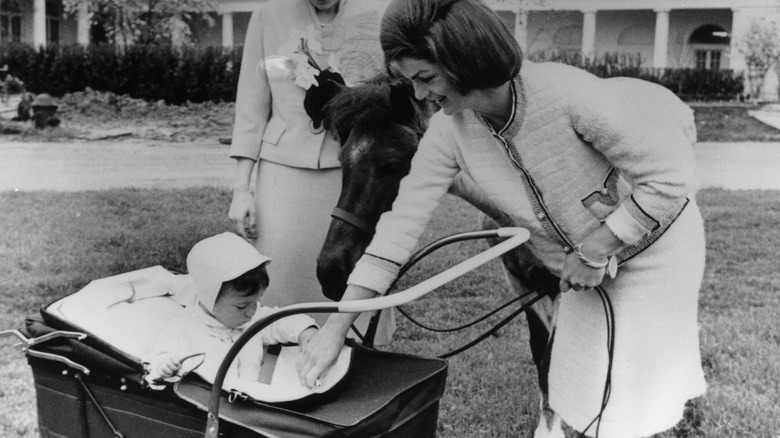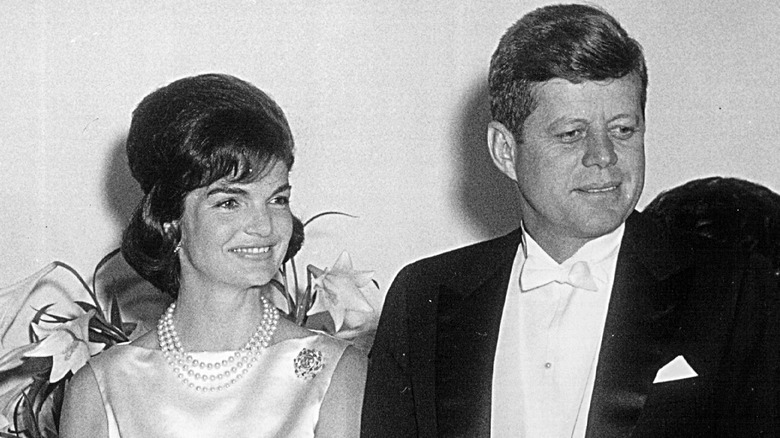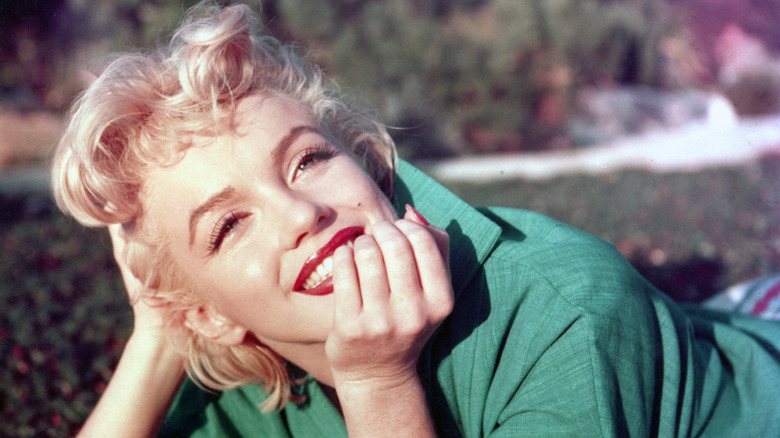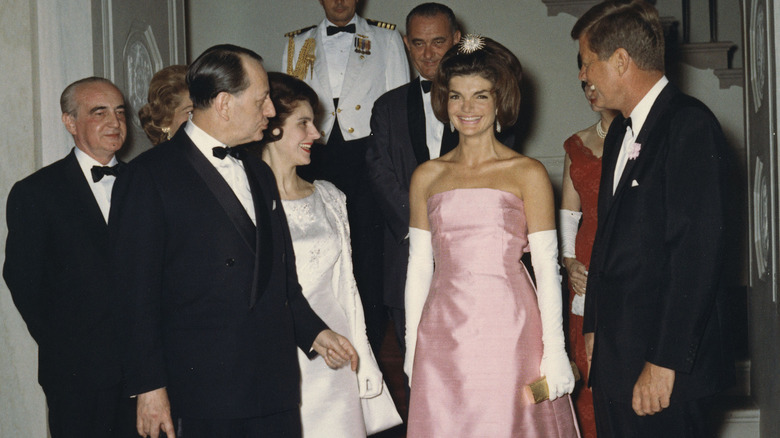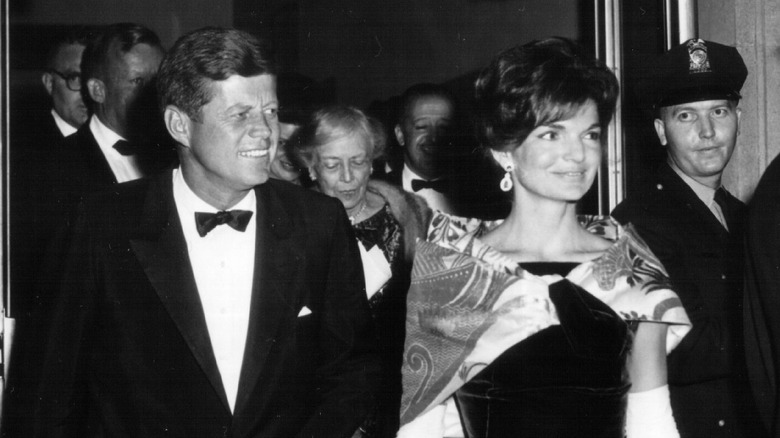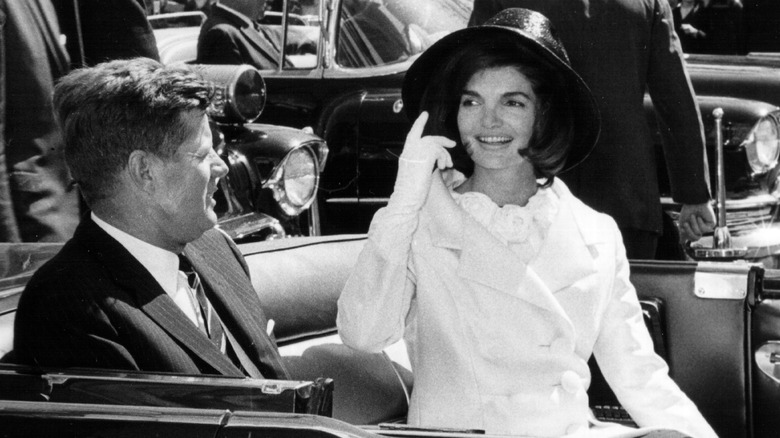What You Never Knew About Jackie And John F. Kennedy's Marriage
John F. Kennedy was a 36-year-old newly elected senator from Massachusetts when he met Jacqueline Lee Bouvier, a 24-year-old socialite from New York who was working as the Inquiring Camera Girl for the Washington Times-Herald (per Library of Congress). The occasion was a Washington, D.C. dinner party thrown by journalist Charles Bartlett on May 8, 1952, according to Politico. After Kennedy asked Bouvier for a date, the courtship proceeded on a long-distance basis, accompanied by photo shoots involving golf, tennis, and relaxing barefoot at the Kennedy compound in Hyannis Port, Massachusetts, per Town & Country.
The couple announced their engagement on June 24, 1953 (via Politico). Their wedding, which took place at a church in Newport, Rhode Island on September 12 of that same year, was to have been a small affair, as Jackie told the Boston Globe, via Biography. But the Kennedy family had other ideas, with over a thousand guests attending the reception, according to Biography. One guest compared the spectacular event to a coronation (via LIFE).
From the very beginning, the Kennedy marriage was, in fact, a spectacle. That's not to say the love between John and Jackie wasn't genuine. However, it was complicated.
It appears JFK had been married once before
When John F. Kennedy met Jacqueline Bouvier in the spring of 1952, he had already been through several romantic relationships, per Time. Something that most people don't know, however, is that John F. Kennedy had apparently been married once before — to a woman by the name of Durie Malcolm, per documents on file with the University of Illinois.
Durie Malcolm was a Palm Beach socialite who had dated JFK's older brother, Joe, for some period of time. At some point, JFK himself had taken Malcolm out on a date, according to a 1961 memorandum-to-file that then-FBI Director J. Edgar Hoover wrote for record-keeping purposes (per The Smoking Gun). The memorandum states that Hoover alerted JFK's brother, Attorney General Robert Kennedy, to the fact that various sources claimed JFK had married Malcolm. According to AOL, it was rumored that JFK and Malcolm had eloped before a justice of the peace in 1947.
From the University of Illinois documentation, it would appear that the Kennedy/Malcolm marriage really happened. But according to author and Pulitzer Prize-winning investigative reporter Seymour M. Hersh, the Kennedy family used its formidable influence to have the marriage annulled and to keep Malcolm from talking about it (via AOL).
Jackie had been engaged once before
"I know I will marry this boy. I don't have to think and wonder," Jacqueline Lee Bouvier wrote in a 1952 letter to her friend Father Joseph Leonard, a Catholic priest she befriended while visiting Dublin in 1950, per the Irish Times. Indeed, The New York Times announced Jackie's engagement to this particular "boy." Nevertheless, by March, it was all over. That boy was not John F. Kennedy — he was John G. Husted Jr., a stockbroker.
As it turns out, the trouble with Husted was that in 1952, he wasn't making enough money to sustain the lifestyle to which Jackie had long been accustomed, per People. That's what Jackie's mother, Janet Auchincloss, informed her daughter when she learned that Husted's annual take-home pay was a mere $17,000, which was the equivalent of roughly $187,500 in 2022.
Janet Auchincloss — who married an heir to the Standard Oil fortune, Hugh Auchincloss, two years after her divorce from Jackie's stockbroker father, "Black Jack" Bouvier — seemed to be a firm believer that money and power were the key ingredients for any successful marriage. Janet worked hard to instill the same values in her daughters. Apparently, her efforts paid off, because following a discussion with her mother, Jackie quickly called off the engagement by slipping the ring back into Husted's jacket pocket.
Jackie acted as JFK's protector, both in life and in regard to his legacy
Jackie Kennedy made it her business to nurture JFK's reputation and defend him from attack, per Vanity Fair. According to the JFK Library, Jackie's protectiveness may have comprised her single most significant contribution to JFK's presidency — and to history itself. First, JFK had myriad health issues starting in childhood, and Jackie took it upon herself to act as his health advocate and custodian of his privacy, per The Atlantic. And when it came to her husband's many alleged infidelities, she was a model of stoic discretion, per People. But it was only after JFK's assassination that Jackie did her most notable work when it came to his legacy.
In the wake of her husband's death, Jackie had her pick of esteemed biographers to begin crafting said legacy, but she chose a relative unknown who she believed would be willing to allow her to control the narrative (via Vanity Fair). Moreover, because Jackie wanted no one to forget that John had once been a war hero, she made sure his funeral procession was reminiscent of the one held for President Abraham Lincoln, per The Washington Post.
Jackie came up with the Camelot analogy for her husband's presidential legacy
From roughly the 12th century A.D. until 1963, the notion of Camelot referred to the castle and court of the legendary King Arthur, per Live Science. But a week after the death of John F. Kennedy, his widow, Jackie, adopted Camelot as a metaphor for the legacy left behind by her husband and his presidency, per People. It was during a meeting with LIFE's Theodore H. White — a mere four days after JFK's burial — that the newly minted presidential widow suggested the analogy.
Jackie said she chose Camelot because it was John's favorite musical, per Vanity Fair. The production had opened on Broadway in 1960 — right around the time Kennedy won the presidential election — and was a huge success, running for 873 performances, according to Masterworks Broadway. "There'll be great presidents again, but there'll never be another Camelot again," Jackie told White after twice quoting the famous lines from the show's finale, which she said were John's favorites: "Don't let it be forgot, That there was once a spot, For one brief shining moment, That was known as Camelot."
The couple endured a miscarriage and stillbirth before their first child was born
Notwithstanding the romanticized perception of the Kennedy marriage, when it came to producing heirs, Jackie and John F. Kennedy struggled with infertility. After the couple's first pregnancy ended in miscarriage in 1955, Jackie was given the devastating news that "carrying and delivering a child would always be difficult for her," per HuffPost. The admonition proved to be true, with their next pregnancy ending in a stillbirth after eight months.
On August 23, 1956, one month before Jackie was due to give birth to the couple's first child, John was cavorting with friends — both male and female — on a Mediterranean cruise when Jackie began to hemorrhage. Soon after, she delivered a stillborn baby girl via Caesarean section. It is believed that the Kennedys declined to name the baby, whose grave marker notes only the word "Daughter" and the date, per the National First Ladies' Library. However, it is widely believed that Jackie referred to her first-born baby as Arabella.
At the urging of his friend, George Smathers, JFK reluctantly left his friends to join his wife as she convalesced at Newport Hospital (per Irish Central).
The death of another child, Patrick, brought them closer
After a miscarriage and a stillbirth in 1955 and 1956, Mr. and Mrs. John F. Kennedy went on to have two healthy children, per HuffPost. Caroline Bouvier Kennedy was born on November 27, 1957 (via Biography). John Fitzgerald Kennedy, Jr. was born almost three years to the day later on November 25, 1960. The newly elected first family moved into the White House soon after, and although the George W. Bush White House Archives claims that the only child to be born to a U.S. president while in office is Esther Cleveland — who was born during her father Grover Cleveland's second term — the fact is that Jackie and John F. Kennedy had a third child, born August 7, 1963, during JFK's presidency.
Perhaps the distinction in the eyes of the Bush Archives is that Cleveland survived childhood (she died in 1980). Patrick Bouvier Kennedy, who was born 5 ½ weeks premature, died two days later of hyaline membrane disease, per HuffPost. Although Patrick's death was, arguably, one of the most devastating moments the Kennedys had to face during their marriage, it also appeared to cement their bond. "Prior to this, they were ... less willing to express their close, loving relationship while out in public. The loss of Patrick seemed to be the catalyst to change all that," one of their Secret Service agents observed in his memoir, per The Salt Lake Tribune.
Patrick's death fueled influential research on preemies
Patrick Kennedy's death on August 7, 1963, struck a terrible blow to Jackie and John F. Kennedy. However, it helped to usher in a warmer, more connected period in the couple's marriage (short-lived as it was, given that JFK was assassinated on November 22, 1963), according to Vanity Fair. It also raised awareness of the most common cause of death in newborns at the time, per The New York Times.
When a baby is born premature, low birth weight can be an issue, but that was not the case for Patrick Kennedy, who weighed in at over 4 pounds. However, at nearly six weeks premature, Patrick's lungs were not able to produce enough of a substance called surfactant, which helps keep the lung's air sacs (alveoli) open, according to Boston Children's Hospital. When the alveoli collapse, the damaged cells — known as hyaline membranes — collect in the airways, making breathing even more difficult.
Survival of hyaline membrane disease — or respiratory distress syndrome, as it is now known — requires ventilated breathing assistance, but that was not understood at the time of Patrick's birth, according to ABC News. The circumstances of Patrick's death helped catalyze the development of the neonatal intensive care unit and the study of neonatology. Today, a vast majority of babies born with the condition survive.
Jackie may have known about and accepted JFK's alleged affairs
Jacqueline Bouvier Kennedy had a pretty good idea of what she was getting into when she decided to marry John F. Kennedy. Although he had only just been elected as junior senator in Massachusetts at the time of their engagement, his presidential ambitions were no secret — nor were Jackie Bouvier's aspirations to be the wife of a powerful politician, rather than some "sad little housewife," as she put it, per The Washington Post. At the same time, Jackie was well aware that John had an almost insatiable need for female attention.
"He's like my father in a way — loves the chase and is bored with the conquest — and once married, needs proof he's still attractive, so flirts with other women and resents you. I saw how that nearly killed Mummy," she wrote in a letter to Father Joseph Leonard, the aforementioned Irish priest she befriended in 1950, via NBC News. Jackie wasn't wrong, and John's alleged affairs with other women throughout the marriage are well-known at this point. But Jackie is believed to have been well aware of them in real-time, according to gossip columnist Liz Smith, who believes Jackie read about them in her column, per People. Nor did Jackie pretend she didn't know about the reported affairs, per Irish Central.
Jackie dealt with JFK's alleged Marilyn affair in an unexpected way
In "These Few Precious Days: The Final Year of Jack with Jackie," author Christopher Andersen asserts that while Jackie Kennedy tolerated her husband's numerous alleged infidelities, one in particular raised concerns, according to Vanity Fair. That was his rumored affair with Marilyn Monroe, and Anderson speculates this is because Jackie regarded Marilyn as someone who could not be trusted to conduct herself with the level of discretion that Jackie believed was critical to the Kennedys' carefully constructed public life.
And she might not have been wrong, had Monroe not died of a drug overdose at age 36 on August 4, 1962, several months after her alleged affair with JFK began, per Irish Central. As Anderson tells it, Monroe had apparent designs on JFK as her next husband, and even went so far as to call Jackie Kennedy on the telephone to inform her that John had promised to marry her, per CBS News. Jackie was unfazed, saying, according to Andersen's book, "Marilyn, you'll marry Jack, that's great ... and you'll move into the White House and you'll assume the responsibilities of first lady, and I'll move out and you'll have all the problems."
Although Jackie tolerated John's alleged affairs, they also hurt her
The fact that Jackie Kennedy tolerated John F. Kennedy's various alleged infidelities and spoke of them glibly if at all does not mean Jackie had no feelings about her husband's reported interest in other women (via People). In fact, there were two instances in which she is believed to have entertained divorcing him, according to Randy Taraborrelli, author of "Jackie, Janet and Lee" (also via People).
Concurring with Taraborrelli are authors Bill O'Reilly and Martin Dugard, who wrote in "The Last Days of John F. Kennedy" that Jackie and John struggled from time to time over what has been described as John's voracious sexual appetites. Further, John did nothing to keep said appetites a secret, with many claiming that he said if he didn't have sex on a daily basis, he'd become physically ill (via L'OFFICIEL).
"Because of my father, I was used to infidelities, but Jack's womanizing hurt me greatly," Jackie is said to have confided in her friend, artist William Walton, per the New York Daily News. She is also believed to have made various attempts to keep John satisfied sexually, including having sex with him on Air Force One, as historian William Manchester claimed Jackie confided to him, per the New York Post.
Jackie had an extramarital confidant
Considering John F. Kennedy's alleged extramarital dalliances throughout his 10-year marriage to Jackie Kennedy, it's not all that surprising that some have speculated Jackie may have sought comfort in the arms of other men. Christopher Andersen's 1996 book about their marriage claims that Jackie had affairs with the actor William Holden, the author Gore Vidal, and the second-in-command of the U.S. Defense Department at the time, Roswell Gilpatric, via UPI. "We loved each other," the book apparently quotes Gilpatric as having said. "She had certain needs and I am afraid Jack was capable of giving only so much."
Nevertheless, there is no documented evidence that Jackie ever actually betrayed her husband, except to the extent that Jackie's ongoing epistolary relationship with the Irish priest, Joseph Leonard could be considered an emotional entanglement. Since the roughly 130 pages of correspondence that she wrote to Leonard over the course of their 14-year friendship — which were made available for auction in 2013, per The Washington Post – contain nothing more than shared confidences, the suggestion of anything beyond an abiding friendship between Jackie and Leonard seems rather a stretch.
JFK may have influenced Jackie's style
Jackie Kennedy was famous for her impeccable fashion sense, per Town & Country – but her first husband, John F. Kennedy, was not. It's not that JFK wasn't well-dressed, per The Rake – it's just that his style was fairly indistinguishable from any number of well-heeled political colleagues. And speaking of heels, a little-known tidbit about the Kennedy marriage is that one of Jackie's secret style hacks was inspired directly by something John was known to do.
According to Jackie's former assistant, via her memoir, "Jackie's Girl: My Life with the Kennedy Family," Jackie would place a quarter-inch lift in the heel of one of each pair of shoes. This was supposedly because one of her legs was shorter than the other. It's possible Jackie became attuned to her own discrepancy because her husband dealt with the same affliction.
According to a 2003 paper published in the Texas Heart Institute Journal, Kennedy's left leg was significantly shorter than the right (nearly an inch difference, per Painopolis). To mitigate the potential back strain that a significant discrepancy may cause, John had heel lifts made for all of his left shoes, thus inspiring Jackie to do the same.
JFK may not have been the greatest love of Jackie's life
Late in life, Jackie Kennedy famously offered the following sage advice on love and marriage: "The first time you marry for love, the second for money, and the third for companionship," per Goodreads. Nevertheless, Jackie never married a third time — not because she didn't find that companionship in her relationship with New York City diamond importer Maurice Tempelsman, who People claims was Jackie's soulmate throughout her final years. Rather, it was because Tempelsman was still married to his first wife, who would not agree to a divorce for religious reasons, per Town & Country.
Jackie Kennedy met Tempelsman for the first time as a result of business he had with JFK concerning the South African diamond trade, but they didn't become a couple until 1982, per People. They then remained inseparable until Jackie's death from cancer in 1994. Of course, this doesn't diminish the love Jackie had for John. In fact, his death devastated Jackie, who told Father Joseph Leonard in a letter that she would have rather died than lose him (via The Irish Times); she also told friends in the wake of the assassination that her life was over, per Vanity Fair. The fact that Jackie could find a loving relationship that lasted until the end of her life might be inspiring to others mourning a similar loss.
